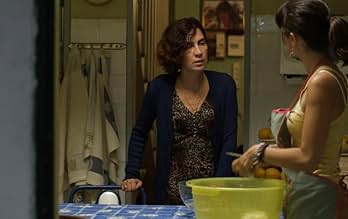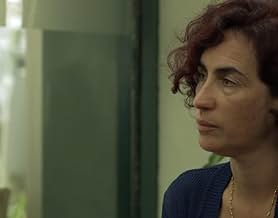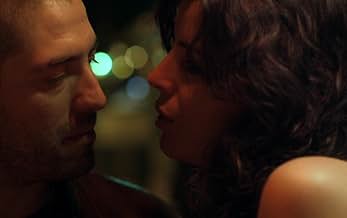VALUTAZIONE IMDb
7,3/10
2116
LA TUA VALUTAZIONE
Aggiungi una trama nella tua linguaA regular family living in the outskirts of Lisbon sees the serenity of their lives shaken beyond any remedy within a week.A regular family living in the outskirts of Lisbon sees the serenity of their lives shaken beyond any remedy within a week.A regular family living in the outskirts of Lisbon sees the serenity of their lives shaken beyond any remedy within a week.
- Regia
- Sceneggiatura
- Star
- Premi
- 21 vittorie e 9 candidature totali
Maria João Vaz
- Algarvio
- (as João Vaz)
Recensioni in evidenza
This movie made a strong impact by exposing the scars of a society living on the margins. It humanizes and dignifies the suffering of the working class, refusing any glamourization or easy redemption. Canijo presents characters who live on the edge, doing so with fierce empathy, leaving the audience with the feeling of having lived, if only for a few hours, within that dark and intense universe. This film is, ultimately, a reflection on family love and the cost of survival in adverse conditions, where every choice is a double-edged sword. It is a work that leaves its mark, highlighting João Canijo's power to explore the human condition in its most complex and often uncomfortable dimensions.
SANGUE DO MEU SANGUE is the most recent film from João Canijo, a respectable Portuguese director. Like other movies he has done before it combines drama with realistic "social" cinema in a very personal and distinctive kind of cinematography. In fact in this movie he keeps the same genre of plot, characters, sets, script and camera work he already did in previous works like SAPATOS PRETOS or GANHAR A VIDA. Canijo always does movies about dark themes, showing us the dark side of society.
This one is no exception. It's a powerful drama about a family which live with low recourses in a working-class neighborhood, in Lisbon's periphery. MÁRCIA (Rita Blanco) is a single mother that lives with her daughter CLAUDIA (Cleia Almeida), son, JOCA (Rafael Morais) and sister, IVETE (Anabela Moreira). CLAUDIA is studying in college to be a nurse, unlike JOCA who fell in the world of criminality (without his family to know though ). IVETE is a single woman in her 30s and has a very solitary life All these characters perform two parallel stories, both quite dramatic and intense The first one is about CLAUDIA and her relationship with a teacher (much older than her of course) and the second one is about JOCA and the drugs he stole from his dealer, TELMO (Nuno Lopes), in order to make some money; but TELMO will find out and things will not be easy to JOCA
This movie, which is always set in a context of social misery, shows us these two complex and multifaceted stories about forbidden love, desolation, sadness, misery (social and human...), frustration, betrayal and revenge.
I enjoyed the acting, I think it's generally good, but I have to mention the performances of Rita Blanco, Anabela Moreira, and Nuno Lopes. These actors really do a great job! About the director's work I also think it's good, in his own personal way, but I must say I found a bit confusing those scenes where there're parallel talks (at parts we see parallel conversations in the same scene and it's really confusing to have two pairs of people talking different issues at the same time. Watch these scenes with subtitles would be even better!...).
All in all it's a good Portuguese film and I score it 7/10.
This one is no exception. It's a powerful drama about a family which live with low recourses in a working-class neighborhood, in Lisbon's periphery. MÁRCIA (Rita Blanco) is a single mother that lives with her daughter CLAUDIA (Cleia Almeida), son, JOCA (Rafael Morais) and sister, IVETE (Anabela Moreira). CLAUDIA is studying in college to be a nurse, unlike JOCA who fell in the world of criminality (without his family to know though ). IVETE is a single woman in her 30s and has a very solitary life All these characters perform two parallel stories, both quite dramatic and intense The first one is about CLAUDIA and her relationship with a teacher (much older than her of course) and the second one is about JOCA and the drugs he stole from his dealer, TELMO (Nuno Lopes), in order to make some money; but TELMO will find out and things will not be easy to JOCA
This movie, which is always set in a context of social misery, shows us these two complex and multifaceted stories about forbidden love, desolation, sadness, misery (social and human...), frustration, betrayal and revenge.
I enjoyed the acting, I think it's generally good, but I have to mention the performances of Rita Blanco, Anabela Moreira, and Nuno Lopes. These actors really do a great job! About the director's work I also think it's good, in his own personal way, but I must say I found a bit confusing those scenes where there're parallel talks (at parts we see parallel conversations in the same scene and it's really confusing to have two pairs of people talking different issues at the same time. Watch these scenes with subtitles would be even better!...).
All in all it's a good Portuguese film and I score it 7/10.
Going way over the safety of ninety minutes into the territory that is so often too long, at two hours twenty, Blood of my Blood easily justifies this extended playtime through captivating characters, patience, flawless pacing and a firm central premise that is supported with every tool at the filmmaker's disposal. The film utilizes a feature that often assists the longer films, it makes use of a large cast of characters. Though having some major focus, the film manages to drift around the experiences of several generations of one family, living in a low-income area of urban Portugal. The linchpin is the mother Marcia, who is a definite mother of the year candidate, just as Rita Blanco, who plays her superbly, is easily my performance of the festival so far. The other major characters are her twenty something kids Cláudia (Cleia Almeida) and Joca (Rafael Morais), then there's their partners, and Marcia's sister Ivete, who pretty much all live in the same tiny flat. Amongst the many links between characters, there are two central plot strands that stand out. Primarily, there's Cláudia's affair with her college professor and her mother's objections to it. Yet almost as prominent is Joca's hazardous attempts to rip off his drug dealer boss. These are quite conventional plot setups and therefore in no way do justice to the originality with which the film is put together. The heart of the film, its soul and its central premise is its interconnectedness. In terms of the plot, the various strands and characters – in addition to this one family at its core – often refer to one another, cross each other's paths, or their relations to one another gradually become apparent. In grander thematic terms, this interconnectedness is related to the strength of community in such a dense, low-income area. This results in the familial bonds being watertight, and people seem sure of themselves in ways that characters rarely do in the countless 'middle-class guilt, straight white men with lost souls' narratives that populate a great deal of art-house hits. In this respect, Blood of my Blood avoids depicting this community with a 'pity the poor' agenda, and although it doesn't suggest it is an aspirational way of life, it certainly doesn't give the usual 'unbreakable cycle destined to fail' scenario.
I suggest that should it be read as such, it will be by people that haven't themselves lived in, or experienced such a low-income community, where there are only two degrees of separation between anyone you might run into in a limited social circle; people that don't know how, within such a microcosm, people are looked out for. The plot very clearly postulates how family are there for one another in the way that Marcia stands by her daughter with such passion and strength, and how the more complex relationship between Jaco and his aunt Ivete plays out. But further to this, we see many subtle narrative elements that illustrate people looking out for each other, or having more than their own narrow motivations at the front of their mind. This is contrasted with the middle class teacher who Cláudia is having an affair with, who seems trapped in an arrested development, not clearly thinking about the wellbeing of Cláudia or for his own wife and family, or even for himself, acting in a familiar self-defeating manner (a human trait depicted so vividly by another outstanding film at the festival Post Tenebras Lux). The film lays the foundations for all these developments at pretty much the outset. After the first scene illustrates the neighborhood they populate and the hazards it contains, the following scene is an iconic dinner table scene. Always a narrative tool to develop and showcase family dynamics, this scene introduces all characters subtly, setting them up with a view to filling in the details as the film progresses. Rather than spoon-feeding exposition on individual characters at this point, the film is much more concerned with establishing the importance of the connections.
Further to these narrative examples, all formal elements worked in harmony with this premise, rather than being used for their own sake with style rather than substance. The interconnected theme was supported by inventive techniques such as the camera coming away from a conversation to allow another conversation to seep into the frame, with both then going on simultaneously; or by the fact that there is very rarely just one thing going on in frame; or that in the absence of any non-deigetic sound or music, the radio or TV can be heard or seen in the background pretty much throughout. This persistently emphasises the hectic nature of this life and that none of these people are islands. Additionally, the long takes – along with being a convention of non/anti-Hollywood cinema – act to gel the different characters together as part of the same organic space. Therefore form and content both support each other to show these characters to be connected as part of this not only literally, but socio-culturally and meta-physically densely populated space.
In spite of the melodramatic plot strands mentioned above, the film is more than anything an earnest and insightful snapshot of life. Over the final credits we hear some Portuguese hip-hop, featuring a chorus comprising of the sample of an American track repeating the words 'street life'. This sums the film up as far as I am concerned; it is simply a slice of street life. I don't think it was relentlessly grim, but nor do I think it was overly celebrated or glamorized; it was simply a slice of life.
I suggest that should it be read as such, it will be by people that haven't themselves lived in, or experienced such a low-income community, where there are only two degrees of separation between anyone you might run into in a limited social circle; people that don't know how, within such a microcosm, people are looked out for. The plot very clearly postulates how family are there for one another in the way that Marcia stands by her daughter with such passion and strength, and how the more complex relationship between Jaco and his aunt Ivete plays out. But further to this, we see many subtle narrative elements that illustrate people looking out for each other, or having more than their own narrow motivations at the front of their mind. This is contrasted with the middle class teacher who Cláudia is having an affair with, who seems trapped in an arrested development, not clearly thinking about the wellbeing of Cláudia or for his own wife and family, or even for himself, acting in a familiar self-defeating manner (a human trait depicted so vividly by another outstanding film at the festival Post Tenebras Lux). The film lays the foundations for all these developments at pretty much the outset. After the first scene illustrates the neighborhood they populate and the hazards it contains, the following scene is an iconic dinner table scene. Always a narrative tool to develop and showcase family dynamics, this scene introduces all characters subtly, setting them up with a view to filling in the details as the film progresses. Rather than spoon-feeding exposition on individual characters at this point, the film is much more concerned with establishing the importance of the connections.
Further to these narrative examples, all formal elements worked in harmony with this premise, rather than being used for their own sake with style rather than substance. The interconnected theme was supported by inventive techniques such as the camera coming away from a conversation to allow another conversation to seep into the frame, with both then going on simultaneously; or by the fact that there is very rarely just one thing going on in frame; or that in the absence of any non-deigetic sound or music, the radio or TV can be heard or seen in the background pretty much throughout. This persistently emphasises the hectic nature of this life and that none of these people are islands. Additionally, the long takes – along with being a convention of non/anti-Hollywood cinema – act to gel the different characters together as part of the same organic space. Therefore form and content both support each other to show these characters to be connected as part of this not only literally, but socio-culturally and meta-physically densely populated space.
In spite of the melodramatic plot strands mentioned above, the film is more than anything an earnest and insightful snapshot of life. Over the final credits we hear some Portuguese hip-hop, featuring a chorus comprising of the sample of an American track repeating the words 'street life'. This sums the film up as far as I am concerned; it is simply a slice of street life. I don't think it was relentlessly grim, but nor do I think it was overly celebrated or glamorized; it was simply a slice of life.
I hope the members of the Academy see Blood of My Blood and nominate the film for Best Foreign Language Film. It is a Cassavetes/Scorsese/Tarantino kind of thriller, that will dry your goats. It's a thriller made of human dramas, rather than suspense or action, with great acting and a modern way of filming. Director Joao Canijo made use of surround sound and camera angles in order to have a complete view of two sequences/discussions at the same time, making ich view more defying.
Besides, Portugal never got a nomination from the Academy, and in the current crisis, no film is being produced or will be if we don't get this recognition. Nominating it will be a statement for Portugal to continue to have an industry.
Besides, Portugal never got a nomination from the Academy, and in the current crisis, no film is being produced or will be if we don't get this recognition. Nominating it will be a statement for Portugal to continue to have an industry.
This sprawling drama about a Portuguese family combines melodrama and social realism so inventively that it practically occupies a genre of its own. Writer-director Joao Canijo grounds the movie in vivid observations of the Lisbon public housing complex where much of the action occurs, and his characterizations—developed, Mike Leigh-style, in close collaboration with the cast--have a similarly gritty authenticity. Yet the movie is also richly stylized, with old- fashioned tracking shots and compositions that allow for two conversations at once, and some narrative developments have the force of Greek tragedy. What emerges is an operatic portrayal of the working poor in which each character's struggle seems monumental. Rita Blanco and Rafael Morais are on top of their game with such deep and complex acting that makes us shiver. One of the best movies I've seen, ever! And definitely the best of 2011.
Lo sapevi?
- QuizPortugal's official submission to the Best Foreign Language Film category of the 85th Academy Awards 2013.
I più visti
Accedi per valutare e creare un elenco di titoli salvati per ottenere consigli personalizzati
- How long is Blood of My Blood?Powered by Alexa
Dettagli
- Tempo di esecuzione2 ore 11 minuti
- Colore
- Mix di suoni
- Proporzioni
- 1.85 : 1
Contribuisci a questa pagina
Suggerisci una modifica o aggiungi i contenuti mancanti

Divario superiore
By what name was Sangue do Meu Sangue (2011) officially released in Canada in English?
Rispondi






























